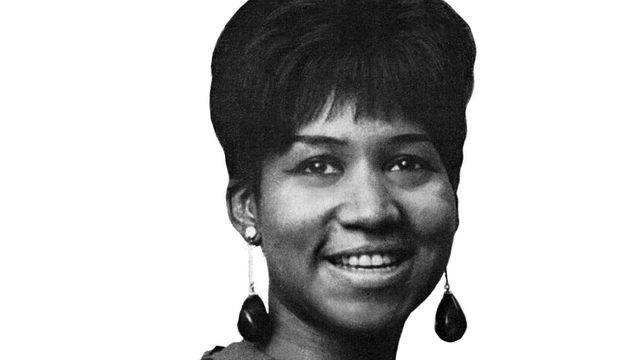The daughter of a preacher, Franklin began her singing career in the church. Her family relocated to Detroit from her birthplace of Memphis when Franklin was a small child so her father could take over the pastorship of the New Bethel Baptist Church, which would become the site of Franklin’s musical debut (and a center of the city’s civil rights movement). After a few years of singing hymns at New Bethel, Franklin accompanied her father on a church tour, playing the piano while he preached. In 1956, Chess Records, which had been recording Rev. Franklin’s sermons, released an album of Aretha, then 14 years old, singing nine gospel hymns.
But the teenage Franklin’s musical interests expanded into the secular realm of pop and soul — in particular the work of another artist with roots in gospel, Sam Cooke. Franklin would profess to having a crush on Cooke, whom she would end up touring with in 1961, in the midst of her own path to crossover stardom. With encouragement from her father, who served as her manager, Franklin signed to Columbia records in 1960, when she was 18 years old, releasing eight albums between then and 1966.
But it wasn’t until 1967, a decade into a then-modest professional singing career, that a 25-year-old Aretha Franklin would become a legend in the making. Declining to renew her Columbia contract, Franklin signed with Atlantic Records and visited the storied Muscle Shoals Sound Studio in an effort to get back to her gospel roots. There, backed by the famed Muscle Shoals Rhythm Section, she recorded what is arguably the most important song of her career, “I Never Loved a Man (the Way I Love You).”
Hitting No. 1 on the R&B charts and peaking at No. 9 on the Billboard 100, it was the first of a string of hits that would make Franklin one of the defining voices of the late ’60s.

From there, Franklin would go on to record and release a series of classics, including a cover of Otis Redding’s 1965 song “Respect” that Franklin would make her signature, followed by hits like “(You Make Me Feel Like a) Natural Woman,” “Chain of Fools,” and “Think,” the last of which got a second life when Franklin re-recorded and performed it in the film The Blues Brothers in 1980.
That same year, Franklin left her longtime home at Atlantic to sign with Clive Davis’s Arista Records, where she would remain for the next 23 years, releasing albums like 1985’s Who’s Zoomin’ Who?, her first ever platinum-selling record, and 1998’s A Rose Is Still a Rose, featuring the single of the same name (written and produced by Lauryn Hill) that would be Franklin’s last significant singles chart success.
But by that time Franklin’s standing as the Queen of Soul, a musical legend, and American music’s premiere diva was well established and immutable. Her status as a national icon was firmly cemented in 2015, when a viral video of her performing at the Kennedy Center Honors spread across the internet.
Performing “Natural Woman” in tribute to the song’s co-writer Carole King, one of the night’s honorees, Franklin held the audience captive as she twirled out of her mink coat in full diva mode. In the audience, King screamed her head off, Michelle Obama grooved in her seat, and then-President Obama, whose first inauguration Franklin performed at in 2009, was in tears. As Franklin brought the performance to its electrifying climax, ad-libbing heart-stopping vocal runs as only she could, the audience leaped to its feet, screaming and applauding in recognition of a legend at work.
“Nobody embodies more fully the connection between the African-American spiritual, the blues, R. & B., rock and roll — the way that hardship and sorrow were transformed into something full of beauty and vitality and hope,” said Obama of Franklin’s performance. “American history wells up when Aretha sings. That’s why, when she sits down at a piano and sings ‘A Natural Woman,’ she can move me to tears — the same way that Ray Charles’s version of ‘America the Beautiful’ will always be in my view the most patriotic piece of music ever performed — because it captures the fullness of the American experience, the view from the bottom as well as the top, the good and the bad, and the possibility of synthesis, reconciliation, transcendence.”
Franklin retired from concert performances in 2017, citing health concerns. “I feel very, very enriched and satisfied with respect to where my career came from, and where it is now,” she said last November when she announced her retirement. “I’ll be pretty much satisfied, but I’m not going to go anywhere and just sit down and do nothing.”
Franklin reportedly struggled with pancreatic cancer from 2011 on, but she always stringently denied the diagnosis. She released her 42nd and final album, A Brand New Me, last November.


















